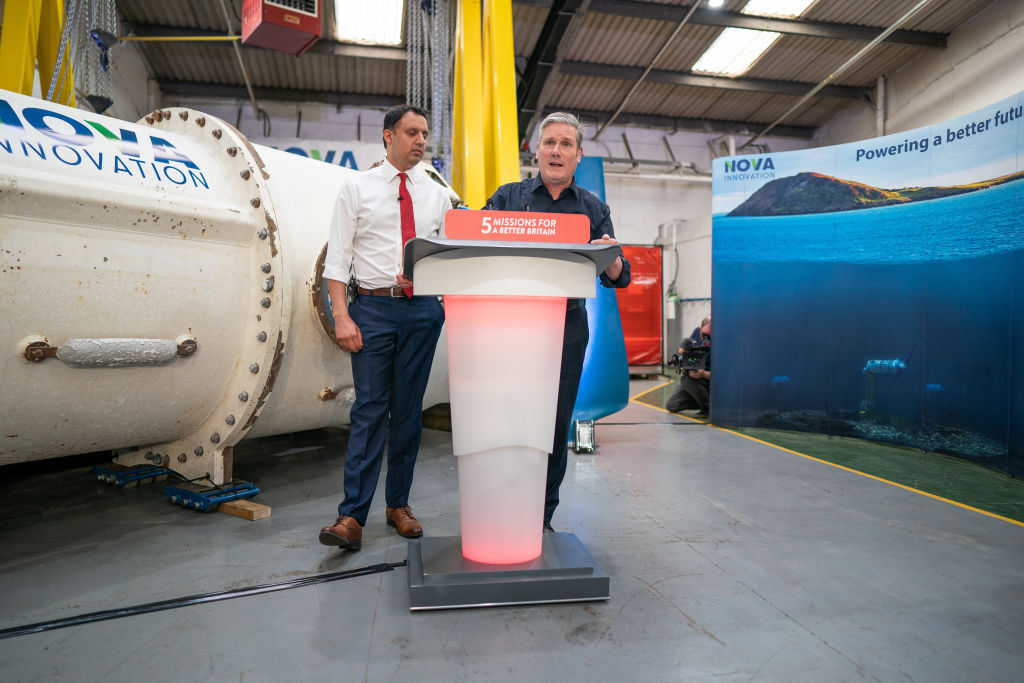The launch of the Labour party’s new green energy mission did not go to plan. The party had promised to ferry journalists to the venue in a hydrogen-powered bus, only for this to be quickly replaced with a diesel alternative on the day. To make matters worse, the bus driver then got lost on route, twisting and turning his way through the narrow streets of Leith. Only after several U-turns, and some helpful directions from a generous journalist, did the bus eventually chug its way – much delayed – to the location of Starmer’s great launch.
As a metaphor for the Labour party’s energy policy, you would be hard pressed to find something more apt. Over the last month, the party has lurched from one position to another, publicly debating how best to marry its commitments to green energy, skilled jobs and sound public finances.
For all the excitement around a resurgence for Sarwar’s party, it still lacks a professional credibility among Scottish voters.
The debacle began more than three weeks ago when Starmer – under the auspices of his shadow secretary of state for climate change and net zero, Ed Miliband – announced that a Labour government would not grant any new licences for oil and gas development in the North Sea. Such a policy would leave one of Scotland’s most important industries facing a cliff-edge shutdown, potentially costing tens of thousands of skilled jobs. It provoked a furious and entirely predictable backlash from opposition parties, energy companies, trade unions and the Scottish Labour party itself.
In an attempt to stem the fallout, various Labour figures, including Starmer and his Scottish counterpart, Anas Sarwar, spent the following days beating a hasty retreat. Starmer wrote for the Times insisting oil and gas would remain a ‘crucial part’ of the UK’s energy mix. For his part, Sarwar said that, while a Labour government would not grant any new licences, it would ‘honour any licenses that are granted’ by the current government.
To further complicate matters, the shadow chancellor, Rachel Reeves, then rowed back on a pledge to spend £28 billion a year on net zero industries, suggesting the figure was not feasible given the strain on government finances. While a reasonable position, this opened Labour to further attacks from the SNP, who suggested Starmer would not just prematurely close down the North Sea oil and gas industry but fail to replace lost fossil fuel jobs with green jobs as well.
It was therefore no surprise when Starmer’s speech, initially planned for 12 June according to a senior party source, was delayed by a week. The Labour party needed more time to decide what its actual policy was, eventually manoeuvring itself into a position that, at best, could be described as an uncomfortable halfway house.
It is happy to support oil and gas as long as someone else approves it, and happy to support a green energy revolution as long as someone else pays for it. As a sop to the Scottish wing of the party, Labour’s publicly-owned clean energy company, GB Energy, will be based in Scotland.
In fairness to Starmer, once the journalists had arrived and the event was actually able to get underway, he navigated this weak position reasonably well. The Labour leader chose to confront – rather than shy away from – much of the concern around his policies and attempted to set out a vision for turning the UK, and Scotland in particular, into a green energy powerhouse.
The problem for the Labour party is not so much the position it has reached, but the way they have reached it. Starmer himself is regularly criticised as a flip-flopper and his constant, very public changing of position on the future of the North Sea will have done little to allay that impression.
Perhaps more importantly still, this is also a huge missed opportunity to cement a Labour recovery in Scotland. For all the excitement around a resurgence for Sarwar’s party, it still lacks a professional credibility among Scottish voters.
An energy plan launched in Scotland was an opportunity to change that perception and cement support among Scottish voters tentatively starting to reconsider backing the party again. Instead, they have witnessed a debacle that will do nothing to reassure them that Labour has changed for the better. Given Starmer’s potential reliance on Scottish seats to propel him to Downing Street, that is a missed opportunity he could well come to regret.






Comments